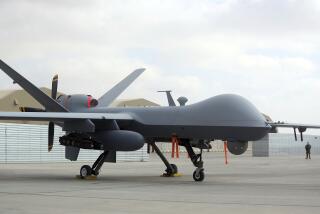NEWS ANALYSIS : Attack by Allies Justified? Serbs Being Watched : Bosnia: Heavy shelling of Sarajevo, cutoff of humanitarian aid are specific indicators.
- Share via
WASHINGTON — U.S. and U.N. policy-makers are paying especially close attention to intelligence reports from Bosnia for the answer to a crucial question: Are the Bosnian Serbs doing anything that would justify an allied air strike against them?
The Serbs are being watched for signs that they are bowing--or not--to the North Atlantic Treaty Organization’s demands Monday to ease their chokehold on the capital of Sarajevo. “Tell me what goes on on the ground and I’ll tell you whether we strike,” a Clinton Administration official told reporters this week.
U.S. officials cite three actions likely to trigger NATO attacks: If the Serbs engage in heavy shelling of Sarajevo, if they cut off “life support” utilities such as fuel and water, or if they block further humanitarian relief efforts.
Those actions sound simple enough. However, U.S. officials concede that there could be disagreement among the allies about whether specific actions by the Serbs are of the kind that NATO authorities have warned would be prohibited.
“The feeling is that you’ll know it when you see it,” one top official said, briefing reporters after NATO’s adoption of the military plan for the air strikes. “The problem is, what looks like (a violation) to Americans may not look like it to the French.”
The decision would turn in part on how defiant the Serbian action is. The more brazen the flouting of NATO warnings, the more likely a strike becomes, a U.S. official said.
The allies have split before in reacting to actions by the Serbs, with the United States generally taking a harder line and European governments willing to allow the Serbs more leeway. Officials said that Serb leaders have learned to play each side against the other.
Under the terms of the NATO accord, U.N. Secretary General Boutros Boutros-Ghali will make the final decision on whether actually to launch air strikes, although NATO officials will make recommendations.
Boutros-Ghali is expected to give great weight to recommendations from NATO’s top policy-makers, who also are his bosses in the U.N. Security Council. But he is also expected to attach more significance than NATO to other factors, such as the peace talks in Geneva and ground action in Bosnia-Herzegovina.
U.S. officials described NATO’s action in Brussels on Monday as “cocking the gun” in preparation for possible action against the Bosnian Serbs. They said that NATO’s North Atlantic Council will call a second meeting to give the go-ahead for an actual strike.
Policy-makers said this second meeting of the council--to authorize the actual strikes--could be called by any NATO member or by Manfred Woerner, the NATO secretary general, or Gen. John M. Shalikashvili, NATO’s commander. The NATO recommendation would be relayed to Boutros-Ghali.
Once military action is ordered, NATO’s plan calls for a graduated scale of increasingly harsh air strikes.
U.S. officials said that Charles E. Redman, the newly named American envoy for the former Yugoslav republics, visited Serbian, Muslim and Croatian leaders on Tuesday to warn them of the possible NATO action.
The officials said that NATO essentially has delivered a double-pronged order to the Bosnian Serbs: They must relieve their strangulation of Sarajevo and “get down to business” in the peace negotiations in Geneva.
Specifically, the United States wants the Serbs to adhere to a “framework peace accord” agreed to a week ago that calls for the partitioning of Bosnia into three parts, including a share for the Bosnian Muslims. The Serbs want to cut the Muslims out of the equation.
The Administration fears that, unless the Bosnian Muslims receive some land, they will turn into a radical guerrilla group similar to those in the Middle East.
U.S. Adm. Jeremy Michael Boorda, head of the NATO forces that actually would carry out the air strikes, was said to be drawing up a list of specific targets.
Officials said that Boorda would coordinate any air action with French Gen. Jean Cot, commander of the U.N. Protection Force in Bosnia.
NATO forces already have 70 warplanes poised for action at about half a dozen bases in Italy and Turkey.
More to Read
Sign up for Essential California
The most important California stories and recommendations in your inbox every morning.
You may occasionally receive promotional content from the Los Angeles Times.













